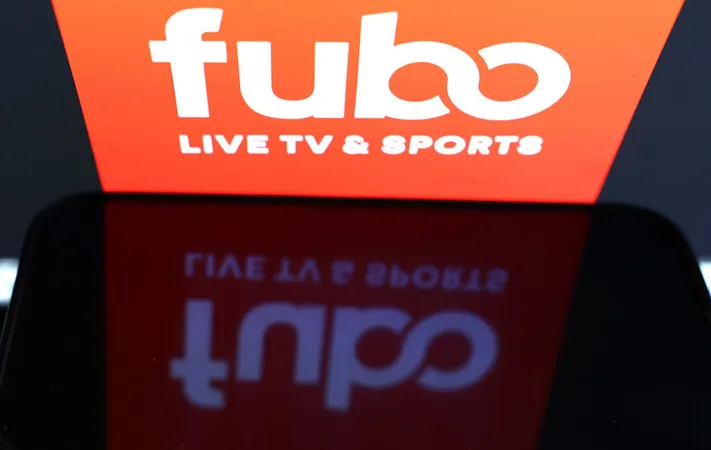
Disney Acquires Fubo, Settling Antitrust Lawsuit and Strengthening Streaming Dominance
2025-01-06
Author: Ming
Disney Acquires Fubo, Settling Antitrust Lawsuit and Strengthening Streaming Dominance
In a groundbreaking move, Disney has agreed to acquire a majority stake in sports streaming platform Fubo, escalating its control over the market amid previously contentious antitrust allegations. This strategic partnership paves the way for a merger that aims to unify Fubo with Disney's Hulu + Live TV service, granting Disney a notable 70% ownership of a company that was once embroiled in legal battles against it.
The new entity resulting from this merger will carry Fubo's name, and its current executives will remain in leadership roles. Subscribers will retain the option to access Fubo's offerings independently, ensuring that viewers can choose between services without mandatory bundling. In a significant shift, Fubo has also agreed to drop its antitrust lawsuit against Disney, Fox, and Warner Bros. Discovery (WBD), which revolved around accusations of monopolistic practices regarding a proposed joint sports app, Venu. Fubo's contention was that the three companies were engaging in tactics that forced it to pay for unwanted channels, hampering its ability to compete fairly in the sports streaming arena.
Part of the deal includes a new carriage agreement that will provide Fubo with access to a range of Disney's valuable sports and broadcasting networks, including ESPN, ABC, and various ESPN-affiliated channels. Additionally, to sweeten the proposition, Disney, Fox, and WBD will collectively pay Fubo $220 million upon transaction closure.
However, this merger faces procedural hurdles. It will require regulatory and shareholder approval and must satisfy other standard closing conditions, with estimations for completion ranging from 12 to 18 months.
Fubo's reversal from adversary to ally symbolizes a notable turnaround for the company that previously voiced serious concerns regarding Disney’s overpowering control, leading to a forecast of potentially stifling competition within the industry. The acquired company had labeled Disney's significant share of the US sports rights market—54%—as problematic, highlighting how it could impede new providers from entering the field. Just months before the merger announcement, Fubo's CEO, David Gandler, publicly criticized Disney and its partners for creating "insurmountable barriers" designed to hinder competition.
Yet, with this acquisition, Gandler claims the merger will bring "greater choice and flexibility" to consumers, ultimately restructuring Fubo's financial landscape to foster “positive cash flow.”
Nevertheless, skepticism lingers within the industry. Critics argue that this acquisition undermines the initial mission of Fubo to champion competitive streaming and challenge Disney's industry hold. Some experts caution that allowing a defendant in antitrust litigation to essentially eliminate its legal woes through acquisition only perpetuates existing market difficulties, leading to fewer options and higher prices for consumers.
Lee Hepner, a senior legal counsel for the American Economic Liberties Project, reiterated concerns, labeling the move a "total deception." Critics contend that this merger does little to alleviate the antitrust issues originally raised by Fubo, rather it may reinforce Disney's monopolistic behavior in the sports streaming sector.
As the streaming world evolves, this seismic deal could have lasting ramifications, further concentrating market control within a behemoth company and challenging the principle of competitive fairness that many stakeholders rely on for a flourishing media environment. The implications are not just for Fubo or Disney but for all streaming consumers who may find themselves with reduced choices down the line.



 Brasil (PT)
Brasil (PT)
 Canada (EN)
Canada (EN)
 Chile (ES)
Chile (ES)
 Česko (CS)
Česko (CS)
 대한민국 (KO)
대한민국 (KO)
 España (ES)
España (ES)
 France (FR)
France (FR)
 Hong Kong (EN)
Hong Kong (EN)
 Italia (IT)
Italia (IT)
 日本 (JA)
日本 (JA)
 Magyarország (HU)
Magyarország (HU)
 Norge (NO)
Norge (NO)
 Polska (PL)
Polska (PL)
 Schweiz (DE)
Schweiz (DE)
 Singapore (EN)
Singapore (EN)
 Sverige (SV)
Sverige (SV)
 Suomi (FI)
Suomi (FI)
 Türkiye (TR)
Türkiye (TR)
 الإمارات العربية المتحدة (AR)
الإمارات العربية المتحدة (AR)